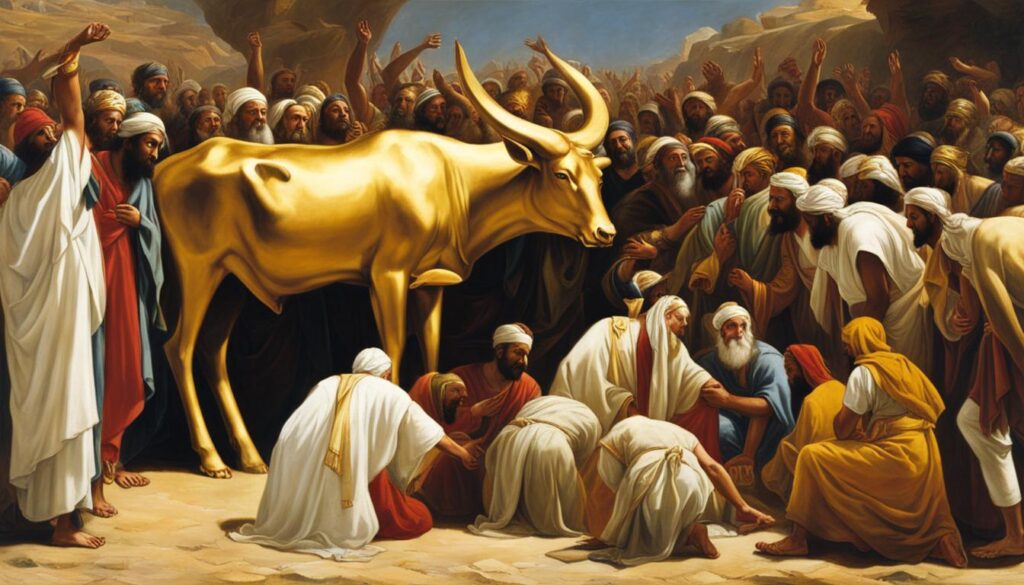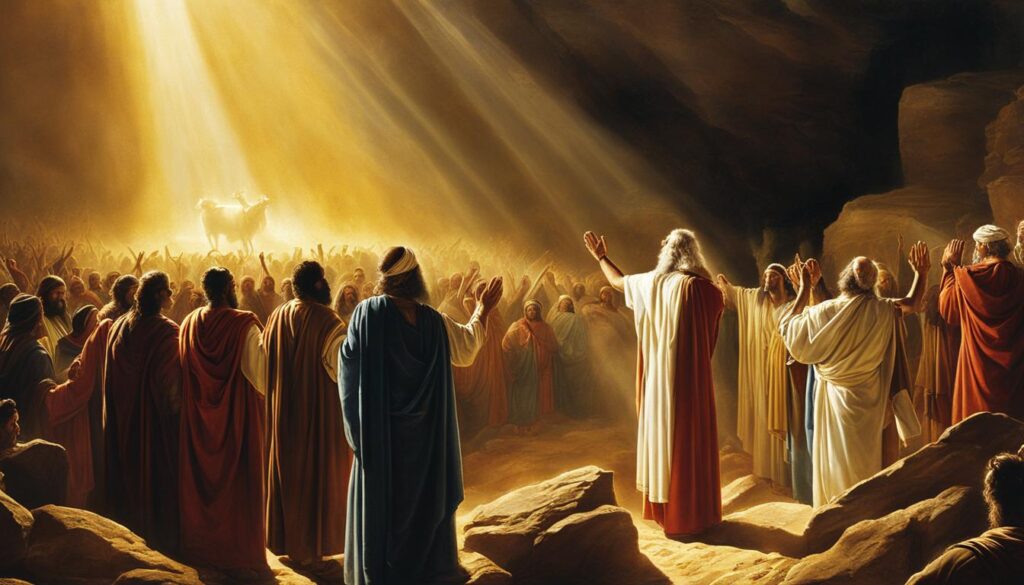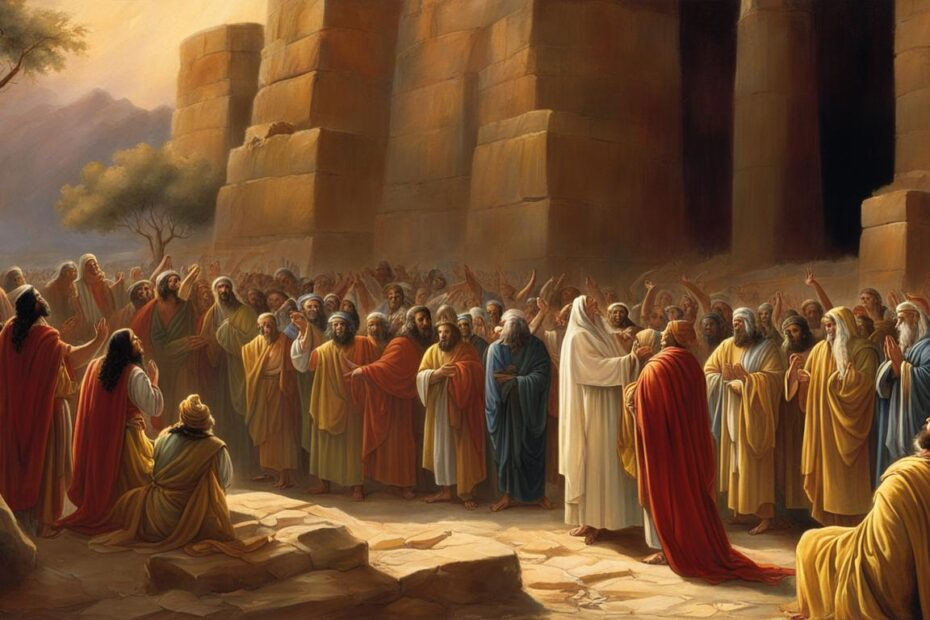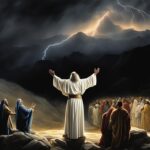In times of despair and wrongdoing, intercession prayer has the power to move mountains and change destinies. One of the most profound examples of intercessory prayer can be found in the story of Moses and the golden calf. It is a testament to the immense impact of standing in the gap for others and seeking God’s mercy and forgiveness.
Key Takeaways:
- Intercession prayer has the power to change the course of events and save lives.
- Moses’ intercession prevented God from destroying the Israelites who had turned to idol worship.
- Idol worship is a betrayal of God’s covenant and a grave sin.
- Aaron’s complicity in creating the golden calf and practicing syncretism led to severe consequences.
- Through bold prayers, Moses persuaded God to spare the Israelites from destruction.
The Sin of the Golden Calf
The story of the golden calf is a stark reminder of the Israelites’ grave sin of idol worship. When Moses delayed in returning from Mount Sinai, the people grew restless and turned to Aaron, asking him to create gods to lead them. Aaron, instead of rebuking them, gave in to their demands and fashioned a golden calf. The Israelites then worshipped the idol, attributing their deliverance from Egypt to it.
This act of idol worship was a betrayal of God’s covenant with the Israelites. It demonstrated their lack of faith and trust in Him, as well as their willingness to turn away from His commandments. The golden calf became a symbol of their disobedience and the consequences that followed.
“When Aaron saw this, he built an altar in front of the calf and announced, ‘Tomorrow there will be a festival to the Lord.’ So the next day the people rose early and sacrificed burnt offerings and presented fellowship offerings. Afterward, they sat down to eat and drink and got up to indulge in revelry.” – Exodus 32:5-6
This alarming scene of idol worship highlights the dangers of syncretism and the mixing of different religious practices. Instead of remaining faithful to the worship of Yahweh, the Israelites blended elements of pagan worship with their worship of God. This syncretism further deepened their disobedience and spiritual waywardness.
As we reflect on the sin of the golden calf, it serves as a powerful reminder to guard our hearts against idolatry and to remain steadfast in our devotion to God. We are called to worship Him alone and to seek His forgiveness when we stray. Through the story of the golden calf, we learn the importance of staying true to our faith and the consequences that await those who turn away from God’s commandments.

Aaron’s Complicity and Syncretism
In the story of the golden calf, Aaron’s involvement and his act of syncretism play a significant role. As the appointed leader in Moses’ absence, Aaron should have stood firm in his faith and rebuked the Israelites for their idolatry. However, he succumbed to their demands and actively participated in the creation and worship of the golden calf.
This act of syncretism, combining elements of pagan worship with the worship of Yahweh, was a grave offense against the true worship of God. Instead of remaining faithful to the covenant and the commandments handed down by God, Aaron allowed the Israelites to blend their newfound freedom with idolatrous practices.
“Their hearts turned back to Egypt, and they created a golden calf. They exchanged their glory for the image of a grass-eating ox.” – Psalm 106:19-20
The Consequences of Syncretism
The consequences of Aaron’s complicity and the act of syncretism were severe. The blending of different religions and practices not only betrayed the covenant but also demonstrated a lack of faith and trust in God’s provision. It undermined the unique relationship between Yahweh and His chosen people, leading to divine anger and disappointment.
God’s desire for pure worship and undivided devotion was compromised, and the Israelites suffered the consequences of their actions. The damaging effects of syncretism serve as a warning to us today, reminding us of the importance of remaining steadfast in our faith and rejecting the temptation to blend it with practices that do not align with God’s truth.
| Effects of Aaron’s Complicity and Syncretism | Lessons Learned |
|---|---|
| Divine anger and disappointment | Staying faithful in times of temptation |
| Undermined relationship with God | Rejecting compromise in worship |
| Consequences for the Israelites | Remaining steadfast in faith |

In the face of Aaron’s compromise and syncretism, Moses’ intercession with God became even more critical. The next section will explore the power of Moses’ prayer and how it averted the destruction of the Israelites.
God’s Anger and Moses’ Intercession
After witnessing the Israelites’ betrayal and idol worship through the golden calf, God’s anger burned against His chosen people. He planned to destroy them and start afresh with Moses, who had faithfully followed Him up to Mount Sinai. But in this moment of crisis, Moses stepped forward as a powerful intercessor, pleading for God’s mercy and forgiveness.
Moses knew the gravity of the situation and understood that the Israelites deserved punishment for their disobedience. However, he appealed to God based on His character of love, compassion, and faithfulness to His covenant. In Exodus 32:11-13, Moses boldly reminded God of His promises to Abraham, Isaac, and Jacob, using his intercession as a means to remind God of His own nature and the relationship He had established with His people.
Through his prayers, Moses demonstrated the power of an intercessor who stands in the gap between the wrath of God and His people. He pleaded for mercy and sought to avert the destruction that the Israelites rightfully deserved. Moses’ intercession serves as a timeless example of the effectiveness of prayer and the willingness of God to respond to genuine repentance and heartfelt pleas for mercy.
The Power of Intercessory Prayer
Moses’ intercession showcases the profound impact of standing in the gap for others and seeking God’s mercy. His bold prayers changed the course of history and saved the Israelites from destruction. This powerful example challenges us to examine our own prayer lives and consider how we can intercede on behalf of others.
- Intercession prayer involves invoking God’s mercy and intervention for the benefit of others.
- It requires a deep understanding of God’s character and a willingness to align our prayers with His will.
- Intercessory prayer has the power to change circumstances, soften hearts, and bring about transformation.
As believers, we are called to follow in Moses’ footsteps and intercede for those in need, seeking God’s mercy and intervention in their lives. Through intercession, we can participate in God’s redemptive work and bring about positive change in the lives of others.
Table: Moses’ Intercession and its Impact
| Intercession Prayer | Impact |
|---|---|
| Moses pleads for mercy and forgiveness | God’s wrath is averted, and the Israelites are spared from destruction |
| Moses reminds God of His promises to Abraham, Isaac, and Jacob | God’s faithfulness and commitment to His covenant are reaffirmed |
| Moses’ prayers change the course of history | The Israelites are given another chance to repent and renew their commitment to God |
*Please note that the table above represents a summary of Moses’ intercession and its impact. The story itself is much more nuanced and detailed in the biblical narrative.

The Power of Intercessory Prayer
Moses’ intercession for the Israelites serves as a powerful testament to the effectiveness of prayer and the transformative power of standing in the gap for others. In the face of the Israelites’ grave sin of idol worship, Moses boldly approached God and pleaded for mercy and forgiveness. Through his intercessory prayers, Moses was able to change God’s intended actions and spare the people from destruction.
Intercessory prayer is more than just a plea for help; it is a sacred act of interceding on behalf of others, seeking God’s intervention and mercy. The story of Moses’ intercession reminds us that through prayer, we have the ability to impact the lives of others and bring about positive change.
When we engage in intercessory prayer, we align ourselves with God’s heart and invite His divine intervention into the lives of those we are praying for. It is a selfless act that requires us to set aside our own needs and desires, focusing entirely on seeking God’s will and mercy for others. In doing so, we become vessels of God’s love and compassion, serving as conduits for His grace and healing.
The Effectiveness of Standing in the Gap
“The prayer of a righteous person is powerful and effective.” – James 5:16
Intercessory prayer holds tremendous power because it taps into the heart of God, who longs to extend His mercy and grace to all. When we stand in the gap for others, we act as bridges between them and God, lifting up their needs, struggles, and desires in prayer. Through our intercession, we create a pathway for God’s blessings and transformative work to flow into their lives.
Furthermore, intercessory prayer not only impacts the lives of those we pray for, but it also shapes our own hearts and deepens our relationship with God. It cultivates within us a heart of empathy and compassion, aligning our desires with God’s desire to see His children saved, healed, and restored.
As we reflect on the power of intercessory prayer exemplified by Moses, let us be inspired to embrace this sacred practice in our own lives. Let us approach God boldly, seeking His mercy and intervention for those in need. Through our prayers, may we become instruments of His love, bringing about transformation and healing in the lives of others.
| Benefits of Intercessory Prayer | Scriptural Support |
|---|---|
| Brings comfort and peace to those in need | Matthew 11:28-30 – “Come to me, all you who are weary and burdened, and I will give you rest.” |
| Invokes God’s mercy and grace | Hebrews 4:16 – “Let us then approach God’s throne of grace with confidence, so that we may receive mercy and find grace to help us in our time of need.” |
| Strengthens our bond with God | James 4:8 – “Come near to God and he will come near to you.” |
| Brings about miracles and supernatural interventions | Mark 11:24 – “Therefore I tell you, whatever you ask for in prayer, believe that you have received it, and it will be yours.” |
Through intercessory prayer, we can witness the power of God’s love and mercy as lives are transformed, hearts are healed, and miracles occur. Let us embrace the privilege and responsibility of intercession, standing in the gap for others and experiencing the joy of seeing God’s power at work.

Moses Breaks the Tablets
Upon witnessing the Israelites’ grave sin of idol worship, Moses was filled with righteous anger. In a moment of frustration and disappointment, he threw down the tablets of the Ten Commandments, shattering them into pieces. This bold act symbolized the broken covenant between God and the people, highlighting the severe consequences of straying from God’s commandments.
The breaking of the tablets served as a powerful visual representation of the Israelites’ unfaithfulness and their abandonment of the covenant they had made with God. It demonstrated the gravity of their sin and the ultimate price they would pay for turning their backs on Yahweh. The shattered tablets became a stark reminder of the importance of obedience and the dire consequences that follow disobedience.
“But now, if you will forgive their sin–and if not, please blot me out of your book that you have written.” – Moses (Exodus 32:32)
In the midst of this betrayal, Moses’ intercession for the people remained unwavering. Despite his own anger, he pleaded with God to forgive the Israelites, even offering to have his own name blotted out of the book of life if it meant their salvation. This selfless act displayed Moses’ deep love for his people and his unwavering faith in God’s mercy.
Consequences of Idol Worship
The breaking of the tablets serves as a poignant reminder of the severe consequences that come with idol worship. The Israelites’ disobedience resulted in the loss of God’s favor and protection, bringing upon themselves the judgment they had invited through their actions. Their worship of the golden calf had dire implications, leading to a breakdown of their relationship with God and the need for repentance and restoration.
It is a powerful lesson for us today, reminding us of the dangers of placing anything or anyone above God in our lives. Idol worship can take many forms, whether it be the pursuit of wealth, power, or fame, or even the idolization of material possessions or relationships. Just as the Israelites suffered the consequences of their idolatry, we too will face the repercussions of our misplaced priorities and devotion.
Ultimately, the story of Moses breaking the tablets serves as a call to return to true worship and obedience to God’s commandments. It reminds us of the importance of honoring God above all else and the need to repent and seek forgiveness when we stray. Through this cautionary tale, we are encouraged to reflect on our own lives and ensure that our devotion is directed towards the One who deserves it.
Conclusion
The story of Moses’ intercession for the Israelites and the repentance and forgiveness that followed holds powerful lessons for us today. It teaches us about the immense power of intercession prayer, where one stands in the gap for others and seeks God’s mercy and intervention on their behalf.
Through Moses’ example, we learn about the consequences of idol worship and the importance of remaining faithful to God’s commandments. The Israelites’ idolatry and Moses breaking the tablets remind us of the severe repercussions that arise from straying from God’s path.
However, amidst the grave sins committed, we also witness the overwhelming mercy and willingness of God to forgive and restore. Moses’ heartfelt prayers moved God to spare the Israelites from destruction, demonstrating that our prayers have the power to shape outcomes and change God’s intended actions.
As we reflect on Moses’ intercession prayer, we are inspired to seek God’s forgiveness for our own failings and to intercede for others who are in need. The story reminds us of the value of standing in the gap for others, offering prayers of mercy and seeking God’s intervention in their lives. By emulating Moses’ example, we can experience the transformative power of intercessory prayer and witness the incredible ways in which God responds.
FAQ
What is the story of the golden calf?
The story of the golden calf involves the Israelites turning to idol worship by asking Aaron to create a golden calf for them to worship. This act of idolatry was a betrayal of God’s covenant and a grave sin.
What did Aaron do in the story of the golden calf?
Aaron, as the appointed leader, participated in the creation and worship of the golden calf instead of rebuking the Israelites for their idolatry. This act demonstrated syncretism, which is the combining of elements of pagan worship with the worship of Yahweh.
Why was God angry in the story of the golden calf?
God was angry because the Israelites had turned to idol worship, breaking their covenant with Him. He planned to destroy them and start afresh with Moses.
What did Moses do to prevent the Israelites’ destruction?
Moses interceded on behalf of the people, pleading with God for mercy and reminding Him of His promises to Abraham, Isaac, and Jacob. Through his prayers, Moses persuaded God to spare the Israelites from destruction.
What does the story of the golden calf teach us about prayer?
The story teaches us about the power of intercessory prayer. Moses’ prayers changed God’s intended actions and resulted in the preservation of the Israelites. It reminds us to seek God’s forgiveness and intercede for others in need.
Why did Moses break the tablets of the Ten Commandments?
Moses broke the tablets as a symbolic act, representing the broken covenant between God and the people due to their unfaithfulness and idol worship.








